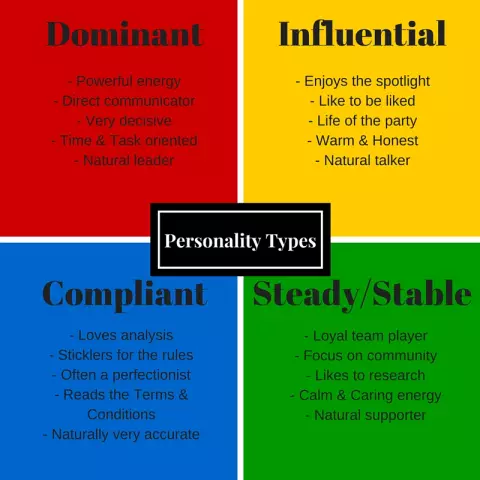- Author Rachel Wainwright wainwright@abchealthonline.com.
- Public 2023-12-15 07:39.
- Last modified 2025-11-02 20:14.
Human traits

Character - these are personality traits that are inherent in a particular person and show his attitude towards others and his own responsibilities. The personal qualities of people are manifested in literally all the actions that they perform. Whether it's work or play, everyone works and relaxes in their own way. Some seek harder tasks and enjoy solving them, others seek easy ways. These people are indifferent to the results of labor. The action is over, the work is over.
The character of a person is manifested in exactly the same way when communicating. So, the reaction of some people to remarks is violent, others - sluggish or practically absent. The quality of response depends on temperament, but is not determined by it.
From the point of view of society, the character traits of a strong person determine his behavior. He is a man of word and deed. A spineless person suffers from non-obligation, does not fulfill promises, completely depends on the circumstances, in a word, goes with the flow.
Human traits are divided into the following categories:
- Motivational - define the goal, guide and support certain activities;
- Instrumental - testify to the manner of performance.
When the task is set, it is the instrumental traits of a person's character that appear, which show how the action is performed: "rolling up or carelessly." In this case, the policy of motivation is important: positive or negative. Thus, a person with a "strong character" does not want to perform work that is unpleasant for him, while a weak character is happy to do what he considers necessary and necessary. An important tool in manifesting a person's character is willpower - a conscious need. Defining a weak-willed personality does not always indicate muscle weakness. More often, on the contrary, people of weak will are ready to obey the “leader”, performing tasks involving the application of physical strength.
The main traits of a person
Despite the fact that each personality is considered unique, nevertheless, people have many similar qualities and many groups belong to a certain psychological type. Attempts to qualify, which are based on the basic traits of a person's character, have been undertaken by psychiatrists since the last century. The German specialist Kremer was the first to draw attention to the connection between morbidity and physique. Then his teaching was developed by the American psychiatrist Sheddon. At the end of the last century, typologies of characters were developed by the following scientists: Fromm, Leonhard, Lichko.
Scientists proceeded from general provisions, the essence of which is formulated as follows:
- The main traits of a person's character are laid even before birth - in subsequent years they appear to one degree or another;
- Absolutely all traits of a person's character are not a set of accidents, but obey strict laws;
- According to their characters, people are divided into groups that have similarities in mental reactions to the same stimuli.
Depending on which traits of a person's character prevail, psychiatrists have divided all personalities into four types:
- Introverts - closed to communication, serious, slow
- Extroverts are relaxed, quick-tempered, cheerful;
- Emotionally stable - balanced, almost indifferent to failures, both to strangers and to their own. They equally have both positive and negative traits of a person's character, therefore they are distinguished by stability and equanimity;
- Emotionally unstable - they are in constant tension, anxious, sensitive to any troubles, both on a personal level and on a global scale.
German psychiatrist Karl Leonhard was not content with these types and developed a different qualification, which formed the basis of psychopathology. Psychopathy, from the point of view of scientific understanding, is not a mental illness, but is a patient who has negative personality traits that are pathological personality disorders. Studying people of different professions, Karl Leonhard came to the conclusion that the qualification of personality traits is not enough, it is important to determine the accentuated traits of a person's character that have a personal manifestation.
Types of personality accentuation according to Leonhard:
- Hypertime - an incorrigible optimist “believing in himself”, despite any setbacks;
- Affective-labile - having both negative and positive traits of a person's character that compensate for each other;
- Dysthymic - a pessimist who expects failures of failure in any business;
- Anxious - fearful, timid, submissive to the "blows of fate";
- Emotive - compassionate, kindhearted. Has positive character traits that are used by others for selfish purposes;
- Affective-exalted - heightened emotional, both positively and negatively.
The listed types of personalities according to Leonhard have exclusively innate human traits, while there are socially determined accentuations:
-

Leading human traits Demonstrative - boasting, deception, vanity. When the threshold of excitability is exceeded, demonstrative personalities develop hysteria;
- Stuck - suspicious, touchy, vain, has a tendency to paranoia;
- Pedantic - conscientious, scrupulous, hypocritical;
- Excitable - heavyweight, hot-tempered, pedantic, dangerous in critical situations.
Domestic psychiatrist Lichko expanded Leonhard's classification in relation to adolescence, adding to ten psychological types one more - conformal, with an increased “herd reflex”. Such a teenager wants to "be like everyone else" the best, in his opinion.
Psychiatric classifications cover absolutely all traits of a person's character, therefore they are successfully used in psychology and pedagogy. The teacher must predict the emotional reactions of students.
Found a mistake in the text? Select it and press Ctrl + Enter.






